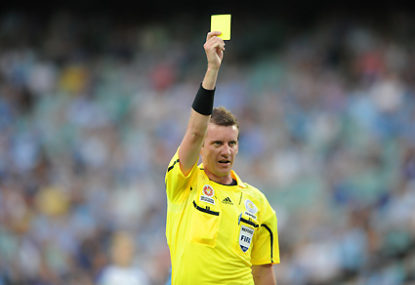UCL Preview: Kane v Bellingham, Kylian's parting gift and the most heavyweight of battles
The UEFA Champions League is the gift that keeps giving for football fans: few major tournaments in any sport can claim to so consistently…

We’ve only had 20 games this season and already the A-League has featured 12 different whistle-blowers, including three debutants and one second-gamer.
It was a similar tale last season, where 10 referees looked after the opening four rounds.
The season before that featured 11 referees in the opening 20 matches.
This is a trend that appears to continue throughout the season, suggesting there is somewhat of a rotation among the A-League referees, with just about all on the referee panel given an early season ‘feeler’.
While this might help increase their experience, get them into the season and build the pipeline in a notoriously under-resourced and high-attrition discipline, there must now be a few questions around whether this is best practice.
This season we had two fairly controversy-free rounds to kick off the season, before Ben Williams took control of the F3 derby in Newcastle, letting Ruben Zadkovich get away with an early crude tackle before awarding the Jets what looked a rather soft penalty.
This week, of course, we’ve had the controversy over Ben Sigmund’s red card for the incident involving Adelaide United’s Jeronimo Neumann, with Jarred Gillett again thrust into the lime-light after the controversy of his injury grand final decision last season, one I felt at the time he got right.
And the Sigmund send-off, upheld by the match review panel yesterday, wasn’t the only talking point of Saturday’s match, with Neumann seemingly offside in the build-up to Cassio’s goal.
The controversy was triggered even earlier last season when Matt Gillett, no relation to Jarred, sent off two Wellington Phoenix players in their round two win over the Newcatle Jets, earning himself a six week stint on the sidelines.
There was a similar outcry then to the one we’ve seen over the past week or so, but it turned out to be far from the only contentious moment of the season.
Some may remember red cards involving Bas van den Brink and Matthew Foschini. There were countless others.
The reality is that referees, right across the globe, are invariably going to be in the spotlight, as we saw over the weekend with a number of incidents in the EPL.
But here we must always be aiming for improvement, and this means the environment for referees has to improve, inevitably moving towards a more professional set up.
That would include not only an opportunity for more full-time whistle-blowers, but better analysis, education and assessment.
Of course, the costs of such an arrangement remain a detriment, and the pending TV deal should at least provide an opportunity to invest a little more in the craft.
But the other question that new A-League head Damien de Bohun and his referees boss, Ben Wilson, need to address is whether the current practice of rotating the referees is the best way forward.
Rather than being dropped or promoted, more often it seems most referees are being given regular games, even if performances haven’t been up to scratch.
Instead, should the better performers maintain their spots week-in, week-out?
Strebre Delovski, for example, widely regarded as the best whistle-blower, has only presided over two games this season, whereas both Jarred Gillett and Peter Green have had three each.
Meanwhile, Kris Griffiths-Jones, one of the better performers last season, has only featured once.
The counter to this argument, of course, is that two of the more accomplished performances this season have come from a couple of the most inexperienced officials, Adam Kersey and Lucien Laverdue.
The latter did the Western Sydney Wanderers’ win in Brisbane on Saturday with little fuss.
It was the same from Kersey in Wellington in round three. He issued only two yellow cards in the Phoenix’s 1-1 draw with the Roar.
How long before we see them again? Nobody quite knows.
Patently, the challenge for an evolving A-League is to ensure that the framework which produces and supports our referees is mature enough to ensure that the focus is consistently on the players and fans.